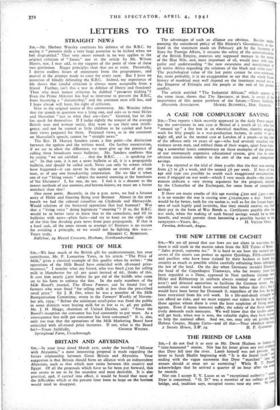A CASE FOR COMPULSORY SAVING
Sta,—Two reports which recently appeared in the daily Press regard. log the convictions in one case at Bristol of a youth of 17, who had " messed up " a fire box in an electrical machine, thereby stopping work for fifty people in a war-production factory, in order in get a night off, and in the second case at London of a youth—at the time of the offence only r6 years of age—who had severely attacked with violence seven men, and robbed them of their wages, apart from form- ing a somewhat ironic commentary on these examples of the product of our enormously expensive educational system, give rise to some obvious conclusions relative to the cost of the was and compulsory savings.
• It was reported at the trial of these youths that the first was earning from £7 to £8 a week, and the second £6 per week. If boys of this age and type can possibly be worth such exaggerated remuneration, even if engaged on war work—which I very much doubt—the circum- stances indicate a very strong argument for the proposal, rejected by the Chancellor of the Exchequer, for MM. C form of compulsory savings.
If there are many youths of this age earning £300 and £400 a year, it is no wonder the war is costing over £12,000,000 a day. Surely it would be far better, both for the nation as well as for the future happi- ness of such highly paid juveniles, that they should receive, say, half their pay in the form. of War Bonds ch Certificates payable after the war ends, when the making of such forced savings would be to their benefit, and would prevent them becoming a possible burden to the


























 Previous page
Previous page